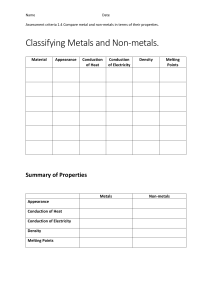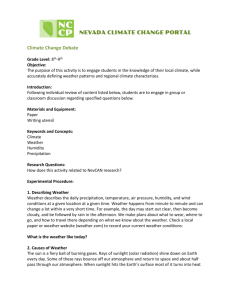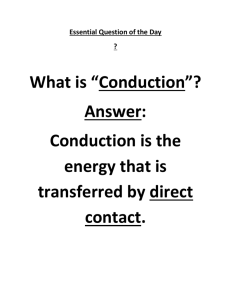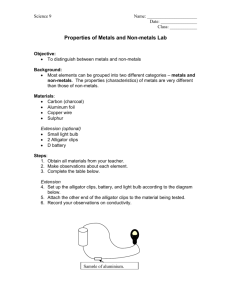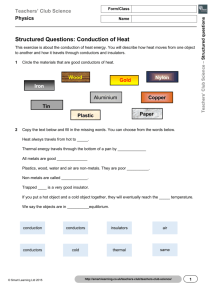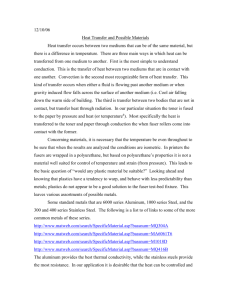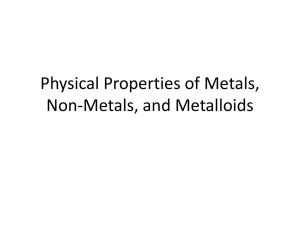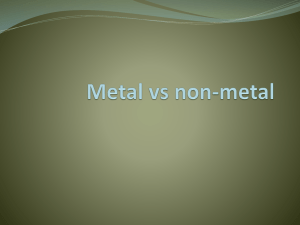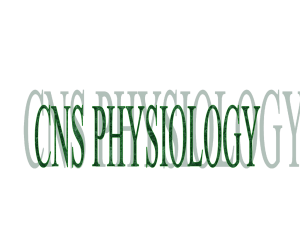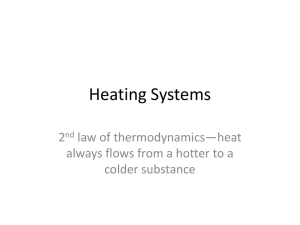File - Lagan College Physics
advertisement
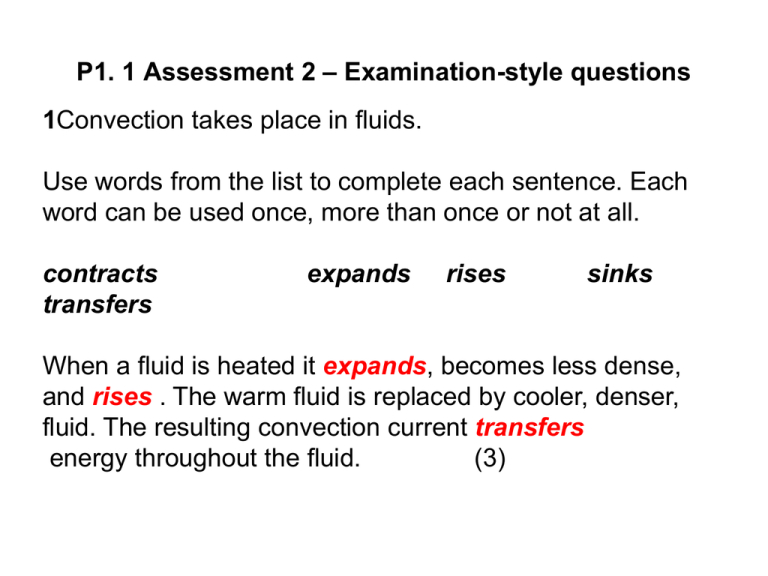
P1. 1 Assessment 2 – Examination-style questions 1Convection takes place in fluids. Use words from the list to complete each sentence. Each word can be used once, more than once or not at all. contracts transfers expands rises sinks When a fluid is heated it expands, becomes less dense, and rises . The warm fluid is replaced by cooler, denser, fluid. The resulting convection current transfers energy throughout the fluid. (3) 2 There are three states of matter: solid, liquid and gas. Complete each sentence. a A solid has a fixed shape and a fixed volume. (1) b A liquid has a fixed volume but not a fixed shape. (1) c A gas has neither a fixed shape nor a fixed volume. (1) d Fluids are liquids or gases. (1) e The particles in a solid vibrate about fixed positions. (1) 3 In an experiment a block of copper is heated from 25°C to 45°C. a Give the name of the process by which energy is transferred through the copper block (1) Conduction b The mass of the block is 1.3 kg. Calculate the energy needed to increase the temperature of the copper from 25°C to 45°C. Specific heat capacity of copper = 380 J/kg °C. Show clearly how you work out your answer. (3) E=mxcxθ E = 1.3kg x 380J/kgoC x (45 – 25) E = 9880J 4 The diagram shows some water being heated with a solar cooker. The curved mirror reflects the sunlight that falls on it. The sunlight can be focused on to the cooking pot. The energy from the sunlight is absorbed by the pot, heating up the water inside. a Suggest one reason why a matt black pot has been used. (2) The pot is absorbing thermal radiation reflected by the mirror. Matt black surfaces are the best absorbers of thermal radiation. b Which pan will keep the water warm for the longer time? Explain your answer.(2) The pan with the shiny metal surface will keep the water warm for a longer time because shiny surfaces are poor emitters of thermal radiation 5 The continuous movement of water from the oceans to the air and land and back to the oceans is called the water cycle. a The Sun heats the surface of the oceans which causes water to evaporate. How does the rate of evaporation depend on i the wind speed increases the rate (1) ii the temperature increases the rate (1) iii the humidity? Reduces the rate (1) b Explain how evaporation causes a cooling effect. A liquid requires energy to change into gas. If the liquid is on a object/surface heat will transfer from the surface to provide the energy needed for the liquid to change into a gas (evaporate). The object will cool down. (3) 6 Give two reasons why a double-glazed window reduces conduction more effectively than a single-glazed window. Glass is a poor conductor of heat. Since double glazing consists of two layers of glass it will be more effective than one at reducing heat transfer by conduction. The two glass layers trap a layer of air or other inert gas which is a very poor conductor of heat, thus reducing heat transfer. (2) 7 In this question you will be assessed on using good English, organising information clearly and using specialist terms where appropriate. Compare the similarities and differences between the process of conduction in metals and non-metals. Metals and non-metals are similar in that the molecules that make them up vibrate more when they are heated. The intermolecular forces allow the molecules to pass their vibrations from one to another. Metals differ in that they have an additional method of conduction. Metals have electrons that can move from one atom to another where as non-metals do not. These free electrons can pass energy through the metal very quickly.
